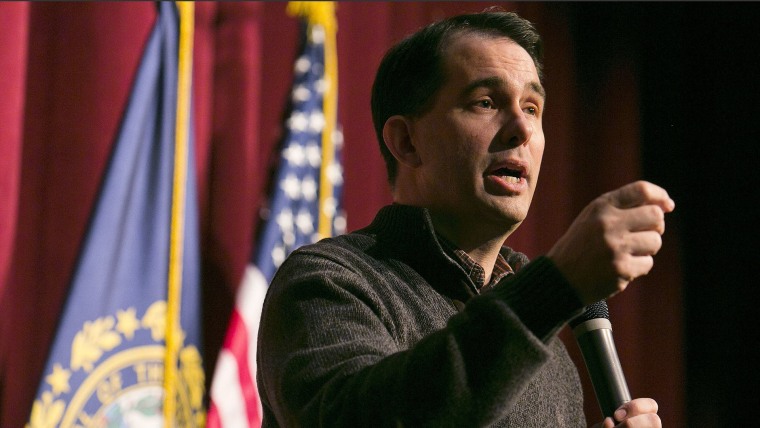Last October, shortly before voters went to the polls, Wisconsin Gov. Scott Walker (R) talked with msnbc's Kasie Hunt about his future. It was already obvious the Republican governor was eyeing the 2016 presidential race, but he still had to win a challenging re-election bid.
Hunt asked him, "Are you committed to serving a full second term?" Walker
replied, "That's my plan."
No, it wasn't. In fact, Walker's actual plan was far different: win a second term; hit the presidential campaign trail; wrap up the state budget process; and launch a national candidacy. As msnbc's Eric Levitz
reported, that last item on the to-do list receives a big check mark today.
The Wisconsin governor simultaneously released an announcement video that echoed that theme, using the candidate's history of legislative and electoral successes in a blue state to distinguish himself from Rubio, and the rest of the primary field. "In Wisconsin, we didn't nibble around the edges. We enacted big, bold reforms that took power out of the hands of the big government special interests and gave it to the hard-working taxpayers -- and people's lives are better because of it," Walker said in the video. "We fought and won. In the Republican field, there are some who are good fighters, but they haven't won those battles. And there are others who've won elections, but haven't consistently taken on the big fights. We showed you can do both."
Whatever one thinks of Walker's approach to governance, his boast is rooted in fact. There are now a whopping 15 GOP candidates in the field -- soon to reach 17 -- and not one has done more to advance a far-right policy agenda than the Wisconsin governor. Indeed, none of his White House primary rivals come close.
And it's that record that will likely carry him very far in his party's nominating contest. There is, however, a catch.
For most of the GOP's constituencies, Walker is practically out of central casting, scripted to be the ideal presidential candidate. Vox's Jonathan Allen today described him today as "
the perfect Republican," embodying the party's modern electorate exactly.
This is especially true on policy grounds. Walker, governing alongside a state legislature run by his Republican allies, has made extraordinary strides undermining organized labor, rolling back reproductive rights, cutting taxes for the wealthy, gutting public education, denying climate change, and scrapping gun-safety laws.
He's been an ambitious, uncompromising, far-right partisan, persevering in a Midwestern state President Obama won twice with relative ease. Walker is promising the GOP base that in the White House he'll do more of what he's already done, all while going after legal immigration and pursuing a constitutional amendment undermining marriage equality.
Perhaps the most amazing thing about Walker's political acumen is his ability to satisfy competing constituencies within the party. We can all think of candidates who are popular with the Republican establishment or popular with the Republican activist base, but the far-right Wisconsinite has managed to curry favor with both contingents. This, coupled with the Koch brothers' support, has positioned Walker as a credible, top-tier contender.
He may be a dull, uninspiring figure, but even that tends to work in the governor's favor -- as
Slate's Jamelle Bouie
noted this morning, Walker is a far-right ideologue "who sounds like a boring accountant who just wants to put a few things in order," not a partisan bomb-thrower.
So what's the catch? Walker's ideas don't work.
Following up on
a piece from a two weeks ago, the
Chicago Tribune recently published
a report with this headline: “Wisconsin economy lags after Walker’s spending and tax cuts.”
In 2011, new Republican Gov. Scott Walker set the creation of 250,000 jobs as the benchmark for success of his new administration. Walker missed that goal by a wide margin over his first term despite an embrace of sweeping tax cuts aimed at stimulating growth. Instead, the cuts helped dig a more than $2 billion hole in the state budget.
Wisconsin ranked 36th among the states and District of Columbia in the pace of private-sector job growth during Walker’s term, trailing all Rust Belt states and all but one other state in the Midwest.
More
specifically, when it comes to job creation, Wisconsin ranked 35th in the nation in 2011, 36th in 2012, 38th in 2013, and 38th in 2014. Walker not only failed to keep his promise about creating 250,000 in his first term, he
barely made it to 129,000.
In May, the
Washington Post reported that the state’s rate of private-sector job growth “is one of the worst in the nation” and Wisconsin’s middle class “has shrunk at a faster rate than any other state in the country.”
Walker, working with a friendly legislature, has done practically everything he wanted to do in the Badger State. The governor told his constituents that if his agenda was put in place, Wisconsin would reap broad, prosperous rewards.
And then he failed -- badly -- in ways Walker still can't explain.
It's entirely possible that far-right primary and caucus voters will overlook this, at least for a while, but on a national level, failures this obvious on the country's top issues are hard to overcome. Walker may be "perfect" on paper, but we already know what happens when his agenda is put in place in the real world, and it's not pretty.
